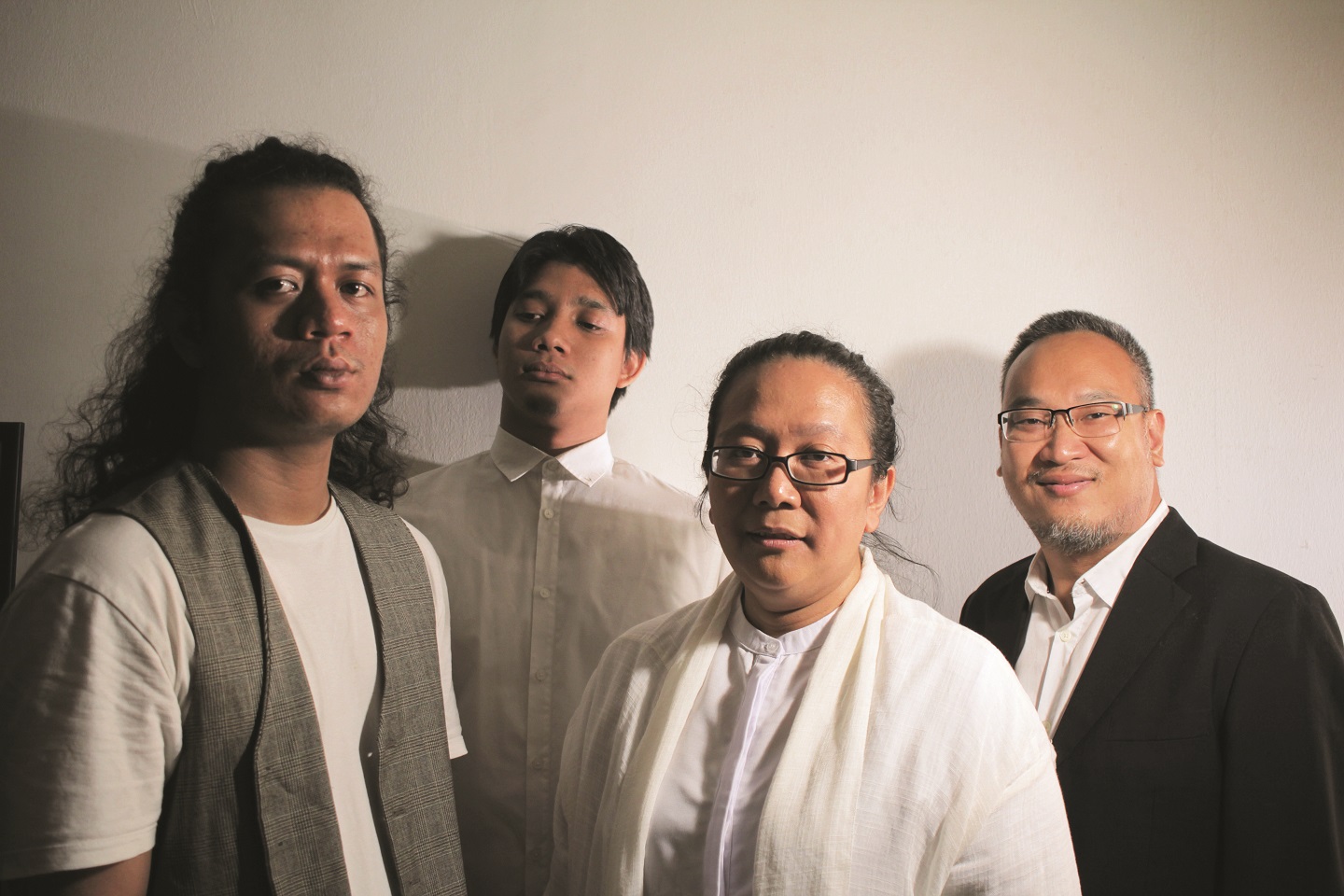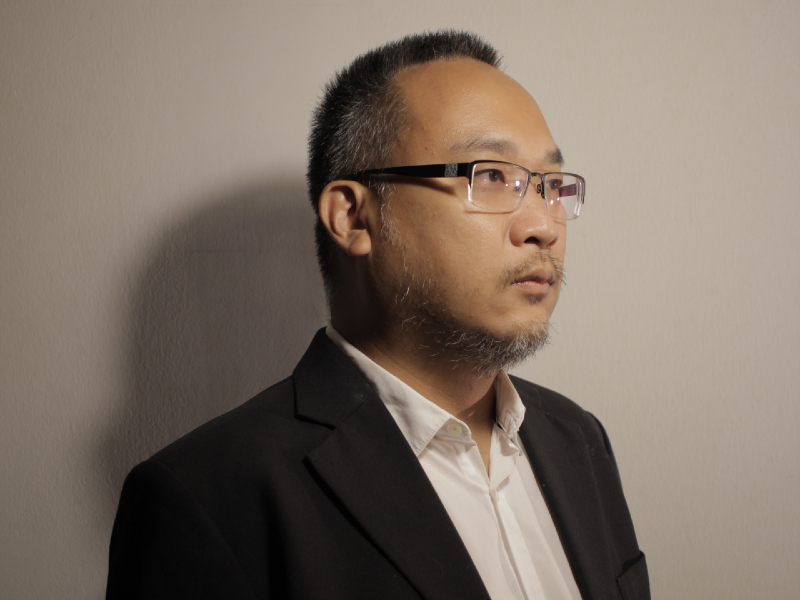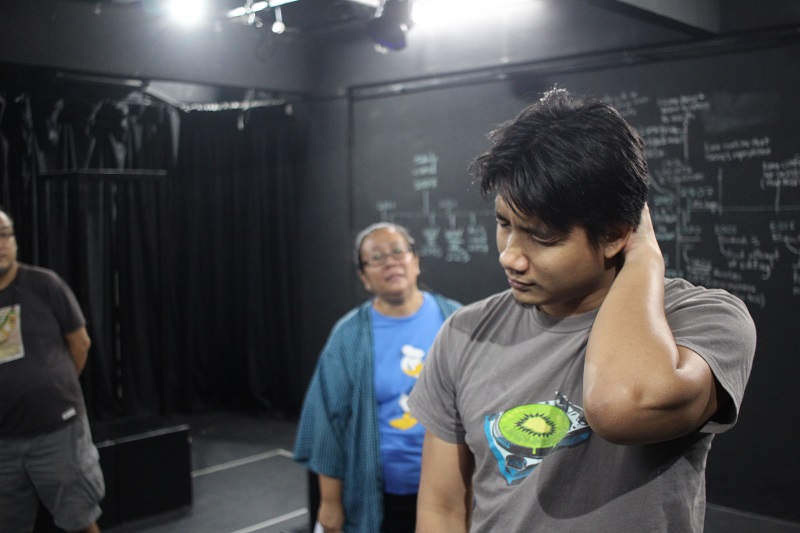
From left: 'Orang Bulan' stage manager Mazar Maamor, Anwar, Dzeelfa and Ling (All photos: theatrethreesixty)
There is a palpable buzz in the air when we turn the corner into the Petaling Jaya Performing Arts Centre (PJPAC). We are here to meet theatrethreesixty artistic director Christopher Ling, who will be premiering Bahasa Malaysia sci-fi play, Orang Bulan, to mark the new theatre’s soft launch.
This being his and the company’s first live show in more than a year, Ling’s enthusiasm is contagious. The opportunity to fill up a blank page also makes up for the bleak 2020 all performing artists like him faced. “I must admit, the idea of having a literal blank canvas offered to me is irresistible. A brand-new space is part of the challenge and excitement of experimental theatre,” he smiles.
Orang Bulan will be presented at PJPAC’s approximately 3,000 sq ft black box named Nero, the smaller of two stages within the venue located at 1 Utama E (1UE) — the latest annex of the sprawling 1 Utama Shopping Centre in Petaling Jaya.
“Size-wise, Nero sits between klpac’s (The Kuala Lumpur Performing Arts Centre) Pentas 2 and penangpac’s (Performing Arts Centre of Penang) Stage 2, though this is a little more squarish, with a higher rig,” the theatre director describes.
ob-christopherling_1.jpg

Orang Bulan is much anticipated as Ling is known for his ability to draw audiences regardless of the setting. His expansive body of work has been staged at venues ranging from typical theatre halls and outdoor public spaces, to theatrethreesixty’s cosy and intimate home base Lot’ng in Subang Jaya, and in particular, black boxes such as Nero.
What we do know is that the play will adopt a wide traverse staging, with the audience sitting on both sides. In accordance with current standard operating procedures, they will be spaced out, with only about 25 people on each side per show.
“I’m biased [towards] this configuration because the audience is close up, and the engagement is closer,” explains Ling.
“That’s truly what makes live theatre so compelling. People go to the theatre to see themselves on stage. We’re all narcissistic in a way; we want to see our issues, our daily concerns mirrored on stage. Engagement happens when we are able to immerse [ourselves] in that world. This past year, we’ve all tried online theatre, but that is something which cannot be replicated as effectively on screen.”
While Ling is a self-confessed sci-fi fan who grew up watching Star Trek on TV, Orang Bulan is his first work within the genre. He admits this is largely because he would have felt the pressure to create an elaborate set if he were to attempt a sci-fi play.
ob-reh2.jpg

Practicalities and budget constraints aside — “If the arts had no money before, now we have even less” — Ling feels Orang Bulan can be stripped down to focus on the actors and the power of the text.
“That’s why, aesthetically, we’ve done just that. It’s staging would feel more similar to Nick Choo’s The Edge, which we presented in Lot’ng,” he highlights.
Ling believes Malaysian theatre should not be divided by language, and points out that his decision to work with Penang-based playwright Yusof Bakar is deliberate. “When I met Yusof and watched one of his works, Romansiprokal, I found his writing very interesting. It’s about very simple, everyday people caught in rather epic situations, and he has a way of framing it that works.”
Orang Bulan is set in a moon colony in the aftermath of Earth’s devastation. The conflict begins when Luna (Dzeelfa Zainal) and her son Nila (Anwar Hadi) are forcibly repatriated to Earth as they are about to be replaced by robots.
The story’s main inspiration is unusual and mysterious. “Central to the play is something called the Resignation Syndrome,” shares Ling. It was first coined when refugee children in Sweden started mysteriously falling into a coma because of the shock of being repatriated. His attention was caught by an award-winning photo captured by press photographer Magnus Wennman in 2018, of two sisters in a family with Resignation Syndrome.
“It’s such a 21st-century phenomenon that it intrigued me. There’s a documentary on Netflix about it, Life Overtakes Me, and you can see how the children amazingly get better when they are told the family has been given a reprieve. Everything about it excited me; I couldn’t comprehend it.”
He sent the image along with a writing brief to Yusof, who deftly wove a tale amid a backdrop of issues dominating our world today: the refugee crisis, climate change and the threat of automation. “Somewhere in there is a discussion of Ted Kaczynski, the Unabomber, and his manifesto, Industrial Society and Its Future, as well,” Ling divulges.
If this sounds a tad overwhelming, the “epic” issues only serve to underscore the fragility of humanity, and perhaps also the bonds and emotions that make our existence so unique. Telling the story from the perspective of a mother and son dealing with an increasingly untenable existence makes Orang Bulan decidedly less far-fetched. And as we know after the developments of this past year, reality can often be stranger than (science) fiction.
'Orang Bulan' will be staged from April 29 to May 2 (9pm) at Nero, PJPAC, Level 2 of 1UE at 1 Utama. Buy tickets here, or call 03 7732 4988 for details.
This article first appeared on Apr 26, 2021 in The Edge Malaysia.


